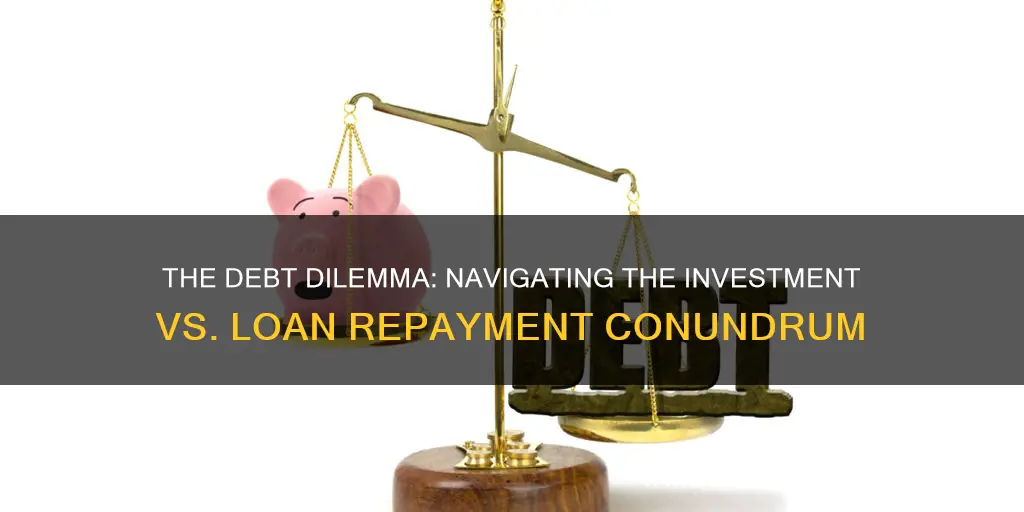
Deciding whether to pay off debt or invest can be a difficult decision. Both are worthy goals, and it's important to weigh the benefits and drawbacks of each option.
Paying off debt first can provide several advantages. It can reduce monthly expenses, improve credit scores, and eliminate the unpredictability of paying more interest on variable-rate loans. Additionally, it can be a significant source of stress and anxiety relief, providing peace of mind and allowing individuals to focus on other financial and personal goals.
On the other hand, investing offers the potential for higher returns and long-term wealth accumulation through compounding interest. Investing early and taking advantage of tax benefits associated with certain types of debt can be advantageous.
The best choice depends on individual circumstances, such as interest rates, investment opportunities, and financial goals. It is recommended to consult with a financial professional to make an informed decision that aligns with one's risk tolerance and goals.
| Characteristics | Values |
|---|---|
| Interest rate on debt | If the interest rate on your debt is 6% or more, pay off debt before investing. |
| Interest rate comparison | Compare the interest rate on your debt with the return you expect to earn on your investments, and contribute to the option with the higher figure. |
| Emergency savings | Ensure you have emergency savings before investing. |
| Credit card debt | Pay off any credit card debt before investing. |
| Tax-deductible interest | If the interest on your debt is tax-deductible, investing may be preferable. |
| Risk tolerance | If you are comfortable with the risk of volatile investments, investing may be preferable. |
| Peace of mind | If debt is causing you stress, paying it off may be preferable. |
| Credit score | If you have a low credit score, paying off debt may be preferable. |
| Retirement | If you are close to retirement, paying off debt may be preferable. |
| Compounding interest | Investing early can take advantage of compounding interest. |
| Tax benefits | If you can benefit from tax deductions, investing may be preferable. |
What You'll Learn

Weigh up the interest on your debt against the potential returns on your investments
Weighing the interest on your debt against the potential returns on your investments is a great way to decide whether to pay off your loans or invest.
Firstly, it's important to note that both investing and paying down debt are good uses for any spare cash. If you can earn more on your investments than your debts are costing you in interest, then investing is a good idea. For example, if you have a mortgage with a 5% interest rate and a stock market index fund returning 10% per year, you will benefit by investing in the index fund.
However, if you have credit card debt at 20%, you would be better off putting your money towards paying that debt rather than investing. Credit card debt is considered high-interest debt, and it is smart to take every measure possible to tackle it. If you have an interest rate of 6% or more on your debt, it is generally recommended to pay this off before investing additional money towards retirement.
It is also worth noting that investments can be volatile. An index fund might be up 10% one year and down 10% the next. While there are some investments that pay a guaranteed interest rate, such as bank certificates of deposit and US Treasury bills, they tend to have low rates of return that rarely exceed the interest rates charged by credit card companies and other lenders.
If you have high-interest debt, it is generally a good idea to pay this off before investing. However, if you have a more aggressive asset allocation, a greater allocation to stocks may result in higher expected returns on your investments, which means investing may be the best option even if your debt has a slightly higher interest rate.
It is also important to consider your feelings and personal risk tolerance. If debt is causing you stress, there is nothing wrong with paying it down sooner, even if the math suggests investing may be a better option.
Goldman Sachs' Global Pay: The USD Advantage
You may want to see also

Consider the impact on your credit score
When deciding whether to invest or pay off loans, it's important to consider the impact on your credit score. While paying off debt can improve your financial health, it can sometimes lead to a temporary dip in your credit score. Here are some factors to keep in mind:
Credit Utilization
Credit utilization, or the amount of credit you're using relative to your credit limits, is a significant factor in credit scores. Keeping your credit utilization below 30% is generally recommended for maintaining a good credit score. Paying off credit card debt can help lower your credit utilization and improve your score. However, if you close the account after paying it off, you lose that account's credit limit, which may increase your overall credit utilization and negatively impact your score.
Average Age of Accounts
The length of your credit history also affects your credit score. Credit scoring models, such as FICO, take into account the age of both open and closed accounts. Closing older accounts can lower the average age of your accounts, potentially leading to a small decrease in your credit score.
Credit Mix
Lenders like to see that you can manage different types of credit, including installment loans (e.g., personal loans, car loans, mortgages) and revolving credit (e.g., credit cards). Having a diverse mix of credit accounts can improve your credit score. If you pay off your only installment loan or revolving debt, it could slightly lower your score. However, credit mix typically only accounts for about 10% of your score, so don't let this deter you from paying off debt.
New Credit Inquiries
Applying for a new loan or credit card can result in a hard inquiry on your credit report, which can lead to a small, temporary drop in your credit score. If you're shopping for loans, consider lenders that offer pre-qualification, which usually only involves a soft inquiry that won't affect your score. Try to limit your applications to a 14-day window to minimize the impact on your credit score.
Payment History
Payment history is one of the most important factors in determining your credit score. Late or missed payments can seriously damage your credit. It's crucial to make timely payments on all your debts to maintain and improve your credit score.
In summary, while paying off loans can sometimes cause a temporary dip in your credit score, the benefits of improving your financial health and reducing your debt typically outweigh the potential negative impact on your score. By understanding the factors that influence your credit score and practicing good money management, you can maintain a good credit score and make informed decisions about investing or paying off loans.
Investor Numbers: Who's in the Game?
You may want to see also

Assess the emotional and mental impact of debt
Debt can have a significant emotional and mental impact on individuals. It can cause stress, anxiety, and depression, affecting one's sleep, mood, energy levels, relationships, and ability to work. These mental health issues can, in turn, lead to further financial difficulties, creating a vicious cycle.
The stress and anxiety caused by debt can manifest in various ways, such as lack of sleep, loss of focus, and constant worry. In some cases, it may even lead to anger directed at oneself or others. Additionally, debt can trigger or worsen existing mental health conditions, such as anxiety and depression, further exacerbating the problem.
The stigma associated with debt can also play a role in its emotional and mental impact. Many people feel ashamed or embarrassed about their financial situation, which may prevent them from seeking help. This can lead to individuals isolating themselves and trying to cope alone, making the problem seem even more overwhelming.
Furthermore, debt can affect an individual's self-esteem and cognitive functioning. It can impair their ability to learn, remember, pay attention, and solve problems effectively. This can have consequences not only for their financial situation but also for various aspects of their life, including their work and personal relationships.
It is important to recognize that debt can affect anyone, regardless of age, race, education level, or personal resources. Life events such as job loss, health issues, or relationship changes can suddenly put people in a financially vulnerable position. Seeking help early on and taking proactive steps to manage debt can help mitigate some of the emotional and mental impacts it may have.
Finding a Trustworthy Investment Planner
You may want to see also

Understand the benefits of investing early
Investing early in life is a smart and easy way to build wealth. Here are some benefits of investing early:
Compound Interest
Compound interest, or earning interest on interest, is a powerful tool for investors. The longer your investments have to grow, the more wealth they can generate. For example, a $10,000 investment at a 5% interest rate will grow to over $70,000 in 40 years, but only $26,000 in 20 years. The earlier you start, the more time your money has to compound and grow.
Risk Tolerance
Young investors can afford to take more risks with their investments. With more time to recover from potential losses, you can invest in more volatile ventures that often yield higher returns. This is especially beneficial if you are interested in investing in the stock market, which tends to be more volatile but can provide greater returns than other investments.
Experience
Starting to invest early gives you valuable experience in the investing world. You will have more time to study the markets, refine your strategies, and learn from your mistakes. This experience will help you make better investment decisions and avoid common pitfalls.
Financial Habits
Investing early helps you develop good financial habits, such as saving money, spending less than you earn, and being patient with your investments. These habits will benefit you throughout your financial life and help you build wealth over time.
Financial Freedom
Investing early can lead to financial freedom. By building up your wealth, you won't have to rely on a paycheck to survive and can pursue your passions instead of being stuck in a job you hate. Early investing gives you the freedom to make confident, attack-minded financial decisions.
Florida: Invest Now or Never?
You may want to see also

Seek professional advice
Seeking professional advice is always a good idea when it comes to financial matters. Financial advisors can provide valuable insights and guidance tailored to your specific situation. Here are some reasons why seeking professional advice is a wise decision when deciding whether to invest or pay off loans:
- Expert Knowledge: Financial advisors are experts in their field and can provide you with knowledge about various investment options and loan repayment strategies. They can explain complex financial concepts, analyse the market, and recommend suitable investment opportunities based on your risk tolerance and financial goals.
- Personalised Advice: Each person's financial situation is unique. A financial advisor will take the time to understand your income, expenses, debt obligations, and financial goals. They can provide personalised advice on how to balance investing and loan repayment, ensuring that you make progress in both areas.
- Risk Assessment: Investing always carries a certain level of risk, and a financial advisor can help you understand and assess these risks. They can guide you in diversifying your investments to minimise risk and maximise returns. Additionally, they can advise on the potential risks associated with different types of loans, such as credit card debt or mortgage loans, and help you develop a plan to manage those risks effectively.
- Tax Implications: Financial advisors can help you navigate the tax implications of both investing and loan repayment. They can advise on tax-efficient investment strategies and explain how interest on your loans may impact your tax obligations. By incorporating tax considerations into your financial plan, you can optimise your investments and loan repayment strategies.
- Emotional Support: Dealing with finances can be stressful, and sometimes emotions can cloud your judgment. A financial advisor can provide an objective perspective and help you make rational decisions. They can offer support and guidance to ease your worries and ensure you feel confident about your financial choices.
Remember, it's important to find a reputable and qualified financial advisor who suits your needs and with whom you feel comfortable sharing your financial details. You can research and compare different advisors to find one who aligns with your goals and risk tolerance.
Brands: Why We Invest
You may want to see also
Frequently asked questions
This depends on your financial situation and goals. If you have high-interest debt, it's generally recommended to pay that off first. Credit cards often carry high interest rates, so focus on paying those off. However, if you have low-interest debt, investing your money may be a better option.
Paying off loans with higher or variable interest rates first can reduce your monthly expenses, improve your credit score, and remove the unpredictability of paying more interest if you have a variable interest rate.
Investing allows you to grow your wealth and generate income. Compounding interest, which is when your returns compound based on your original principal investment, can help your money grow exponentially over time.
Yes, you can adopt a hybrid approach by paying off your debt and investing simultaneously. This allows you to work towards both short-term and long-term financial goals.
Consider the type of loans, interest rates, investment opportunities, and your financial goals and risk tolerance. It's also important to assess your emotional and mental state, as debt can cause significant stress and anxiety.







